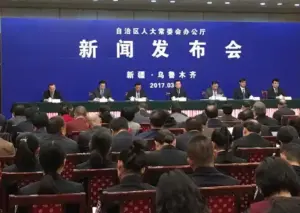关于印发《新疆生产建设兵团互联网政务网站管理暂行办法》的通知
http://www.12s.gov.cn/gk/zfxxgkbz/56852.htm
Xinbing Office [2012] No. 46
Notice on Issuing the “Interim Measures for the Administration of Internet Government Websites of Xinjiang Production and Construction Corps”
All divisions, colleges (schools), departments and directly affiliated institutions of the Corps:
The “Interim Measures for the Administration of Internet Government Websites of Xinjiang Production and Construction Corps” has been reviewed and approved by the Corps Commander’s Office Meeting and is now issued to you for implementation.
Corps General Office
March 16, 2012
Interim Measures for the Administration of Internet Government Websites of Xinjiang Production and Construction Corps
Chapter I General Provisions
Article 1 In order to strengthen the construction and management of Internet government websites of Xinjiang Production and Construction Corps (hereinafter referred to as the Corps), ensure the efficient and safe operation of Internet government websites, and give full play to the role of Internet government websites in social management and public services, this Measures are formulated in accordance with the “Regulations on the Disclosure of Government Information of the People’s Republic of China”, “Opinions on Deepening Government Information Disclosure and Strengthening Government Services” (Zhongbanfa [2011] No. 22), “Notice on Further Strengthening Government Website Management” (Guobanhan [2011] No. 40) and other relevant laws and regulations and documents, combined with the actual situation of the Corps.
Article 2 These Measures apply to the Internet government websites of administrative departments, public institutions with public management functions and other organizations (hereinafter collectively referred to as government departments) within the scope of the Corps.
Article 3 Internet government websites are important platforms and windows for the Corps at all levels and departments to publish government information, provide online services and interact with the public on the Internet, and are an important part of the Corps’ e-government. Citizens, legal persons and other organizations have the right to obtain government information and services through Internet government websites.
Article 4 Internet government websites adhere to the guidance of Deng Xiaoping Theory and the important thought of “Three Represents”, thoroughly implement the scientific development concept, firmly establish the concept of people-oriented, and serve the “three modernizations” construction of the Corps and better play the “three major roles”.
Article 5 Internet government websites adhere to the construction principles of “comprehensive planning, intensive construction, hierarchical management, and resource sharing”, and follow the management and operation principles of “who is in charge is responsible, who operates is responsible”.
Chapter 2 Website System
Article 6 Internet government websites are composed of three-level government portal websites of the Corps, Division (City), and Regiment and Farm, and government department websites at the Corps and Division (City) levels. Form an Internet government website group system with the government portal website as the main site and the government department website as the sub-site.
Article 7 The government portal website of the Corps is hosted by the Corps, undertaken by the Corps General Office, and the Corps Information Technology Service Center is responsible for operation, maintenance and management.
Article 8 The Corps General Office is the administrative department in charge of the management of the Internet government website, responsible for promoting, guiding, coordinating and supervising the construction and management of the Corps Internet government website. The Corps Information Technology Service Center is the daily work agency for the management of the Corps Internet government website, responsible for the business management and technical guidance of the Corps Internet government website, and at the same time, provides the basic environment and technical support for the construction of the Corps government department website.
Article 9 The offices of each division (city) as the administrative department in charge of the management of the division (city) Internet government website should clarify the daily work agency for the management of the division (city) Internet government website. Each division (city), regiment and each department should clarify the website supervisor and designate a special agency or personnel to be responsible for the construction, operation and maintenance and management of the website at this level and department. The list of institutions and personnel and contact information of government portal websites at all levels shall be reported to the General Office of the Corps for record, and the list of institutions and personnel and contact information of government department websites shall be reported to the General Office (Department) at the same level for record. If there are any changes, they shall be notified and updated in a timely manner.
Article 10 Government portal websites at all levels of the Corps shall establish links with their sub-sites and superior portal websites on the homepage, and government department websites shall establish links with government portal websites at the same level on the homepage. Each government portal website shall formulate corresponding technical specifications to achieve resource sharing, coordinated co-construction and overall linkage.
Article 11 We must do a good job in the intensive construction of Internet government websites. New government department websites must rely on the unified platform of government portal websites at the same level, and existing government department websites must be gradually integrated into the unified platform.
Chapter III Information Disclosure
Article 12 Internet government websites are important platforms for the disclosure of government information at all levels and departments of the Corps. The disclosure of government information follows the principles of “disclosure as the principle, non-disclosure as the exception” and “fairness, equity and convenience for the people”.
Article 13 The General Office of the Corps is the competent department for the disclosure of government information in the Corps, and is responsible for promoting, guiding, coordinating and supervising the disclosure of government information in the Corps. The competent departments for government information disclosure of divisions (cities) and regiments are responsible for promoting, guiding, coordinating and supervising government information disclosure work at their level.
Article 14 Internet government websites shall establish standardized information collection, review, release and update mechanisms, disclose government information in a timely and accurate manner, and adhere to the principle of “whoever is in charge is responsible, whoever releases is responsible”. The departments and units that release information are responsible for conducting confidentiality review of the information to be disclosed in accordance with the “Xinjiang Production and Construction Corps Information Disclosure Confidentiality Review Measures”, which must be approved by the responsible person for confidentiality review and the responsible leader. Information disclosure shall not endanger national security, public security, economic security and social stability, and shall not infringe upon the legitimate rights and interests of citizens, legal persons and other organizations.
Article 15 The competent departments for Internet government websites shall organize the preparation of government information disclosure guidelines, disclosure catalogs and annual reports on disclosure work in accordance with the provisions of the Government Information Disclosure Regulations.
The government information disclosure guidelines and disclosure catalogs shall be released and updated at the beginning of the year and modified in a timely manner according to changes, and the annual report on government information disclosure work for the previous year shall be published before March 31 each year.
Article 16 The government portal websites at all levels of the Corps shall publish and update the following information in a timely manner in accordance with the requirements of “strictly in accordance with the law, comprehensive and truthful, and timely and convenient for the people”:
(a) Overview, organizational structure, leadership profile and division of labor;
(b) Administrative normative documents, statistical information on national economic and social development, and major work arrangements;
(c) Overall planning, special planning, regional planning and related policies for national economic and social development, approval and implementation of major construction projects, financial budgets, and final accounts reports;
(d) Important meetings, major events, and personnel appointments and removals;
(e) Timely and accurate release of leadership work dynamics and press conferences covering a wide range of areas;
(VI) Items, basis, and standards of administrative and institutional charges, catalogs, standards, and implementation of government centralized procurement items;
(VII) Policies, measures, and implementation of poverty alleviation, education, medical care, social security, and employment promotion, and supervision and inspection of environmental protection, public health, production safety, food and drugs, and product quality;
(VIII) Early warning information and response to public emergencies;
(IX) Items, basis, conditions, quantity, procedures, deadlines, and catalogs of all materials required to apply for administrative licenses and their handling;
(X) Other government information that should be proactively disclosed in accordance with laws, regulations, and rules.
Article 17 The government departments at all levels of the Corps shall publish and update the following information on their Internet government websites in a timely manner:
(i) Information on the name of the department, functions and powers, service scope, office location, service telephone number and staff job responsibilities;
(ii) Administrative approval procedures, form downloads and relevant policy answers;
(iii) Various service guides and service information for the public;
(iv) Various administrative normative documents;
(v) Various government dynamics, announcements, notices, public notices, public notices and other government information disclosed to the news media;
(vi) Other government information that should be proactively disclosed in accordance with laws, regulations and rules.
Chapter IV Online Services
Article 18 Comprehensively sort out administrative business, optimize administrative processes, and provide online administrative affairs and public services. The online services of Internet government websites are required to be user-centric, comprehensive, practical and easy to use, taking into account the usage habits of different users and providing users with appropriate guidance and instructions.
Article 19 Online services of Internet government websites are generally implemented through service guides, form downloads, online consultations, online inquiries and online processing.
Article 20 When providing online services, the government portal websites at all levels of the Corps shall follow the handling mode of “one-stop acceptance at the front desk, coordinated handling at the back desk, and feedback within a limited time at the front desk”, and provide “one-stop” services through service guides and online guidance.
Article 21 The websites of government departments at all levels of the Corps shall provide online services for administrative licensing matters, non-confidential administrative approval matters and other public service matters within the scope of the department’s authority, broaden public service channels, and improve service efficiency.
Article 22 The integration of public service resources by Internet government websites shall be based on the principle of “service-oriented and user-centered”, and various public service matters shall be integrated according to user objects and application themes.
Article 23 In the construction of public services, the government portal websites at all levels of the Corps shall adhere to the principle of “resource integration, departmental co-construction, and service promotion”, and focus on integrating service resources closely related to public life such as education, social security, employment, medical care, housing, transportation, certificate handling, business establishment, qualification certification, marriage, childbirth and adoption, and public utilities.
Article 24 The government departments at all levels of the Corps shall provide administrative service resources and social welfare service resources within the scope of their departmental functions on their departmental websites.
Chapter 5 Interactive Communication
Article 25 Internet government websites should follow the principle of “serving the overall situation, ensuring security, facilitating and benefiting the people, and focusing on effectiveness” to establish and improve online interactive communication services and a working mechanism with government portal websites as platforms and websites of various government departments jointly maintaining and interacting.
Article 26 Government portal websites at all levels of the Corps should gradually establish public participation channels covering columns such as leadership mailboxes, online interviews, and public Q&A. Carry out online surveys, online hearings, and online reviews around important decisions at all levels and matters closely related to the public interest. An audit mechanism should be established for interactive communication columns.
Article 27 Government departments at all levels of the Corps should seriously treat inquiries, suggestions and complaints related to the work responsibilities of their departments, and respond promptly in an appropriate manner.
Chapter 6 Presentation Form
Article 28 Internet government websites should promptly update their websites according to the development of e-government and changes in public demand

